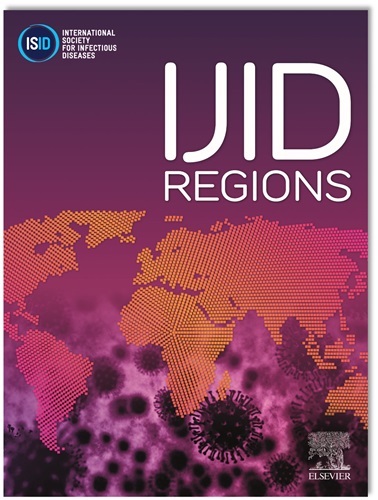绘制非洲恶性疟原虫突变图:对新出现的耐药性及其对疟疾控制的影响的重要回顾。
IF 4.3
2区 医学
Q1 INFECTIOUS DISEASES
引用次数: 0
摘要
疟疾在非洲仍然是一个重大的公共卫生问题,恶性疟原虫kelch13突变的出现威胁到以青蒿素为基础的联合疗法的效力。回顾了2019年至2024年非洲报告的Pf当前遗传多样性和相关影响因素。结果表明,证实的kelch13突变主要分布在东非地区,尤其是厄立特里亚(R622I, 68%)和乌干达(R561H, 52%)。在卢旺达(C469F, 36%)、乌干达(C469F, 59%, P441L, 69%)和坦桑尼亚(P441L, 20%)均有出现Pf突变的记录。伴药耐药标志物Pfcrt、Pfmdr1、Pfdhfr和Pfdhps在东非(30-38%)和西非地区(44-55%)普遍存在。导致Pf突变发生的关键因素被确定为药物压力(23-35%)、滥用抗疟药物(10-12.5%)和跨境人口流动(10%)。本综述认为,迫切需要完善疟疾控制规划,关键是加强药物监管,提高社区对适当治疗做法的认识,并整合分子流行病学监测系统。本文章由计算机程序翻译,如有差异,请以英文原文为准。
Mapping Plasmodium falciparum mutations in Africa: A critical review of emerging drug resistance and implications for malaria control
Malaria remains a significant public health concern in Africa, with the efficacy of artemisinin-based combination therapies being threatened by the emergence of Plasmodium falciparum (Pf) kelch13 mutations. The current genetic diversity of Pf and associated contributing factors reported in Africa between 2019 and 2024 were reviewed. It was shown that validated kelch13 mutations are mainly distributed in east African regions, particularly, in Eritrea (R622I, 68%) and Uganda (R561H, 52%). Emerging Pf mutations have been documented in Rwanda (C469F, 36%), Uganda (C469F, 59% and P441L, 69%), and Tanzania (P441L, 20%). Resistance markers for partner drugs, including Pfcrt, Pfmdr1, Pfdhfr, and Pfdhps, were prevalent in eastern (30-38%) and western African regions (44-55%). The key factors contributing to the development of Pf mutations were identified as drug pressure (23-35%), misuse of antimalarial drugs (10-12.5%), and cross-border population movements (10%). This review posits a critical need to refine malaria control programs, crucially reinforcing drug regulations, enhancing community awareness on appropriate treatment practices, and integrating molecular epidemiologic surveillance systems.
求助全文
通过发布文献求助,成功后即可免费获取论文全文。
去求助
来源期刊
CiteScore
18.90
自引率
2.40%
发文量
1020
审稿时长
30 days
期刊介绍:
International Journal of Infectious Diseases (IJID)
Publisher: International Society for Infectious Diseases
Publication Frequency: Monthly
Type: Peer-reviewed, Open Access
Scope:
Publishes original clinical and laboratory-based research.
Reports clinical trials, reviews, and some case reports.
Focuses on epidemiology, clinical diagnosis, treatment, and control of infectious diseases.
Emphasizes diseases common in under-resourced countries.

 求助内容:
求助内容: 应助结果提醒方式:
应助结果提醒方式:


